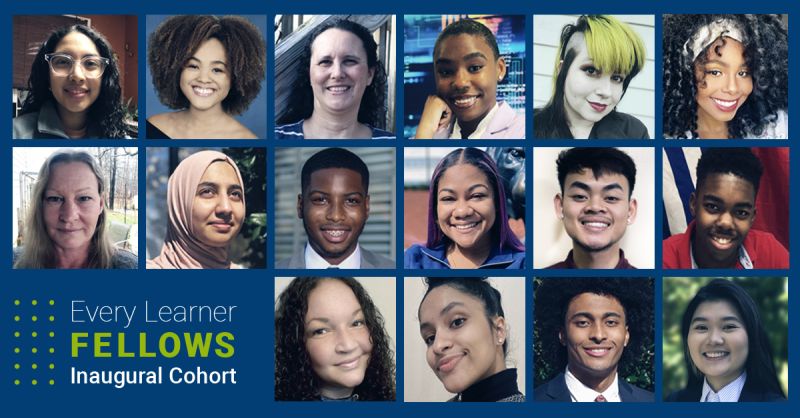In late 2020, partners in the Every Learner Everywhere network were asking themselves a question: How could their collaborative work be more proactive about centering college student voices, since that is one of the network’s stated principles?
Two colleagues at the research, design, and strategy consultancy Intentional Futures, Tia Holiday, Postsecondary Education Lead, and Senior Strategist Tynan Gable, envisioned bringing students directly into the work in a fellowship program. In collaboration with Every Learner Everywhere’s Director, Jessica Rowland Williams, and Associate Director, Laura DaVinci, they outlined a programmatic mission and objectives, recruited organizational partners, and by early 2021 were soliciting applications.
The inaugural Every Learner Everywhere Fellowship Program that resulted is a six-month professional development opportunity for college students to work on projects related to digital learning with Every Learner Everywhere partners. Meanwhile, it provides tremendous value to the network by bringing in the expertise and experiences of students to inform how digital learning technology is used.
The Fellowship program came together quickly, and the response from students has been extremely positive. “We thought we were going to get 10 applications,” says Holiday. Instead, they got 135 applications from all over the country, and 16 Fellows were selected for the program, running from February 15 through July 15, 2021.
Student expertise
“Students are experts in their own lived experience,” says Gable, “so we talk a lot in the network about how important it is to incorporate student voice and perspective in the development and implementation of digital learning technology.”
For example, individual students have perspectives on learning in an emergency remote format during COVID, navigating a four-year university as a racially minoritized student, or selecting an asynchronous program that supports a non-traditionally aged student making steady progress on a degree.
These critical insights are often overlooked but can help colleges and universities develop impactful academic programs and digital learning experiences for Black, Latino, Indigenous, poverty-affected, and first-generation students.
While gathering student expertise on equity-centered digital learning was a major goal of the program, Holiday and Gable also wanted to make sure it was a valuable experience for the Fellows and not simply “an internship program that extracts information and gives nothing back to students,” says Holiday.
They worked with partners in the Every Learner Everywhere network to develop projects that would impart valuable skills Fellows can use in their careers and put on their résumés. Fellows are working on one of four projects: Research and data analysis with Digital Promise, instructional design and group facilitation with Achieving the Dream, educational technology innovation with Intentional Futures, or student engagement and program design with SXSW EDU.
Designed with equity
The Fellows are contributing approximately 120 hours of work during the program, and they receive a stipend of $3,000. “Having a paid internship is one of the many ways we’re trying to uphold equitable practices within our own programs,” says Holiday.
The number one criteria for selecting Fellows was experience using digital learning tools or courseware. Priority was given to students who were racially minoritized or affected by poverty. Gable notes that designing the application process to attract a wide range of diverse students was a way that she and Holiday aimed to put Every Learner Everywhere’s equity principles into practice.
In order to reduce bias toward students based on work history or internships, Holiday and Gable didn’t require résumés. “The expertise we needed was in digital learning as a student, and résumés couldn’t tell us that,” Gable says.
Instead, applicants responded to three prompt questions about their passion and perspective. Holiday says they were also flexible about how students submitted their application materials. Some students wrote essays, and others submitted videos or portfolios.
“That was an excellent way to see the range of amazing talents coming from students,” she says.
Related reading: 5 Ways to Put Equity at the Heart of Instructional Design
Trust and empower
After a two-week orientation, the Fellows began working on assigned projects with partner programs, and they continue meeting as a cohort weekly for conversations about equity in higher education.
They also participate in related professional development activities. These activities include hearing from guest speakers in different industries and a selection of workshops on résumé building, LinkedIn profiles, and other career skills. (In fact, watch this blog section for the results of a professional writing workshop some of the Fellows are currently participating in.)
“We’ve tried to create an environment where the Fellows know we trust them,” says Gable. “This allows us to have conversations that are honest and authentic.”
Holiday and Gable wanted open channels of communication that involve Fellows in their professional development. And, critically, they envisioned a program that disrupts the inequity in higher ed that is exacerbated when educational leaders fail to ask a diverse range of students about their experiences.
“One of our primary goals was to design experiences and services that center and value the Fellows’ expertise in digital learning and equity,” Holiday says. “Another was to make sure we’re providing students with social capital. They can go back to their own situations and feel confident they’re not the only one feeling a certain way.”
As a result, Gable notes, they’ve heard already from multiple Fellows who have been empowered to challenge leaders and educators. She says, “It’s exciting to know they will change the minds of educators about the way they approach designing for and with students.”
Related reading: Why Equity in Higher Ed Requires Centering the World of Work



